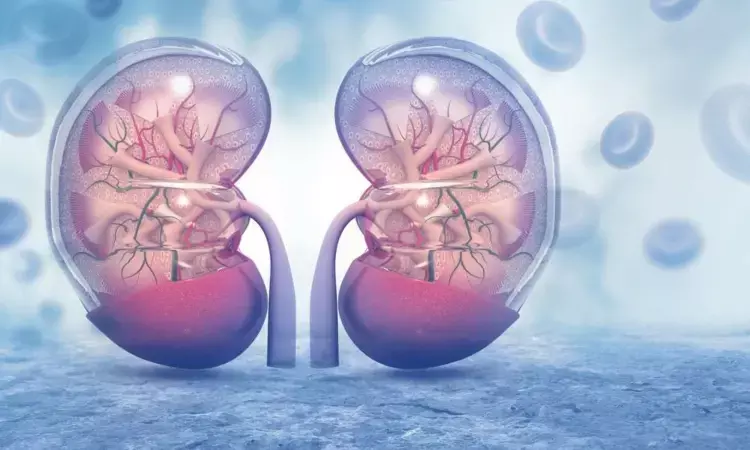- Home
- Medical news & Guidelines
- Anesthesiology
- Cardiology and CTVS
- Critical Care
- Dentistry
- Dermatology
- Diabetes and Endocrinology
- ENT
- Gastroenterology
- Medicine
- Nephrology
- Neurology
- Obstretics-Gynaecology
- Oncology
- Ophthalmology
- Orthopaedics
- Pediatrics-Neonatology
- Psychiatry
- Pulmonology
- Radiology
- Surgery
- Urology
- Laboratory Medicine
- Diet
- Nursing
- Paramedical
- Physiotherapy
- Health news
- Fact Check
- Bone Health Fact Check
- Brain Health Fact Check
- Cancer Related Fact Check
- Child Care Fact Check
- Dental and oral health fact check
- Diabetes and metabolic health fact check
- Diet and Nutrition Fact Check
- Eye and ENT Care Fact Check
- Fitness fact check
- Gut health fact check
- Heart health fact check
- Kidney health fact check
- Medical education fact check
- Men's health fact check
- Respiratory fact check
- Skin and hair care fact check
- Vaccine and Immunization fact check
- Women's health fact check
- AYUSH
- State News
- Andaman and Nicobar Islands
- Andhra Pradesh
- Arunachal Pradesh
- Assam
- Bihar
- Chandigarh
- Chattisgarh
- Dadra and Nagar Haveli
- Daman and Diu
- Delhi
- Goa
- Gujarat
- Haryana
- Himachal Pradesh
- Jammu & Kashmir
- Jharkhand
- Karnataka
- Kerala
- Ladakh
- Lakshadweep
- Madhya Pradesh
- Maharashtra
- Manipur
- Meghalaya
- Mizoram
- Nagaland
- Odisha
- Puducherry
- Punjab
- Rajasthan
- Sikkim
- Tamil Nadu
- Telangana
- Tripura
- Uttar Pradesh
- Uttrakhand
- West Bengal
- Medical Education
- Industry
GI Symptoms in Type 1 Diabetes patients linked to progression of Kidney Disease

A recent cross-sectional study has shed light on the higher frequency and severity of gastrointestinal symptoms in patients with type 1 diabetes who also have progressive diabetic kidney disease (DKD) compared to those with stable kidney markers. This association suggests a potential link between gastrointestinal symptoms and the progression of DKD, providing valuable insights for clinicians managing these patients. This study was published in Biomedicines journal.
The study, led by Aleksejs Fedulovs, MSN, from the University of Latvia, aimed to investigate the relationship between DKD progression and diabetic gastroenteropathy in patients with type 1 diabetes. DKD is a condition that gradually damages the kidney's filtering system and affects about one in three people with diabetes in the United States, potentially leading to kidney failure. Early intervention can help prevent or slow down DKD, reducing the risk of complications.
For this study, researchers utilized data from the longitudinal LatDiane study, which prospectively followed patients with type 1 diabetes. The study cohort included adult patients who were diagnosed with type 1 diabetes before the age of 40, initiated insulin treatment within one year of diagnosis, and had low C-peptide levels.
In the study, 100 patients with type 1 diabetes were included. Among them, 27 patients had progressive DKD, defined by a decline in estimated glomerular filtration rate (eGFR) exceeding 3 mL/min/1.73 m2/year and/or an increase in albuminuria stage during follow-up, while 73 patients had stable DKD.
Gastrointestinal symptoms were assessed using a questionnaire that included 17 questions about pain, discomfort, bowel movement issues, and constipation. Patients' responses were used to calculate the mean frequency and intensity of gastrointestinal symptoms.
The results indicated that patients with progressive DKD had significantly higher gastrointestinal symptom scores compared to those with stable DKD. Notably, 52% of patients with progressive DKD experienced bowel movement disorders, compared to 22% of patients with stable DKD.
Further analysis revealed correlations between gastrointestinal symptom scores and various clinical parameters. Gastrointestinal scores negatively correlated with eGFR, weight, blood erythrocyte counts, and blood hemoglobin, while they positively correlated with albuminuria, HbA1c levels, and diabetes duration.
Univariate regression analysis found that higher scores in gastrointestinal symptoms were associated with greater odds of DKD progression. However, this association lost significance when adjusted for several factors, with diabetes duration emerging as the only significant predictor of DKD progression.
Colonoscopies were performed for a subset of patients with persistent gastrointestinal symptoms, with some showing abnormal macroscopic and histopathological findings, including eosinophil infiltration, lymphocytes, plasmacytes, lymphoid follicles, and lymphoid aggregates.
In conclusion, this study highlights the link between gastrointestinal symptoms and the progression of DKD in patients with type 1 diabetes. While further research is needed to fully understand the causal relationships in the gut-kidney axis, these findings underscore the importance of recognizing and managing gastrointestinal symptoms in these patients to potentially mitigate DKD progression.
This study adds to the growing body of research focused on understanding the factors contributing to the progression of diabetic kidney disease in patients with type 1 diabetes. It emphasizes the significance of early detection and intervention for gastrointestinal symptoms in this patient population.
Reference:
Fedulovs, A., Tzivian, L., Zalizko, P., Ivanova, S., Bumane, R., Janeviča, J., Krūzmane, L., Krustins, E., & Sokolovska, J. Progression of diabetic kidney disease and gastrointestinal symptoms in patients with type I diabetes. Biomedicines,2023;11(10):2679. https://doi.org/10.3390/biomedicines11102679
Dr Riya Dave has completed dentistry from Gujarat University in 2022. She is a dentist and accomplished medical and scientific writer known for her commitment to bridging the gap between clinical expertise and accessible healthcare information. She has been actively involved in writing blogs related to health and wellness.
Dr Kamal Kant Kohli-MBBS, DTCD- a chest specialist with more than 30 years of practice and a flair for writing clinical articles, Dr Kamal Kant Kohli joined Medical Dialogues as a Chief Editor of Medical News. Besides writing articles, as an editor, he proofreads and verifies all the medical content published on Medical Dialogues including those coming from journals, studies,medical conferences,guidelines etc. Email: drkohli@medicaldialogues.in. Contact no. 011-43720751


